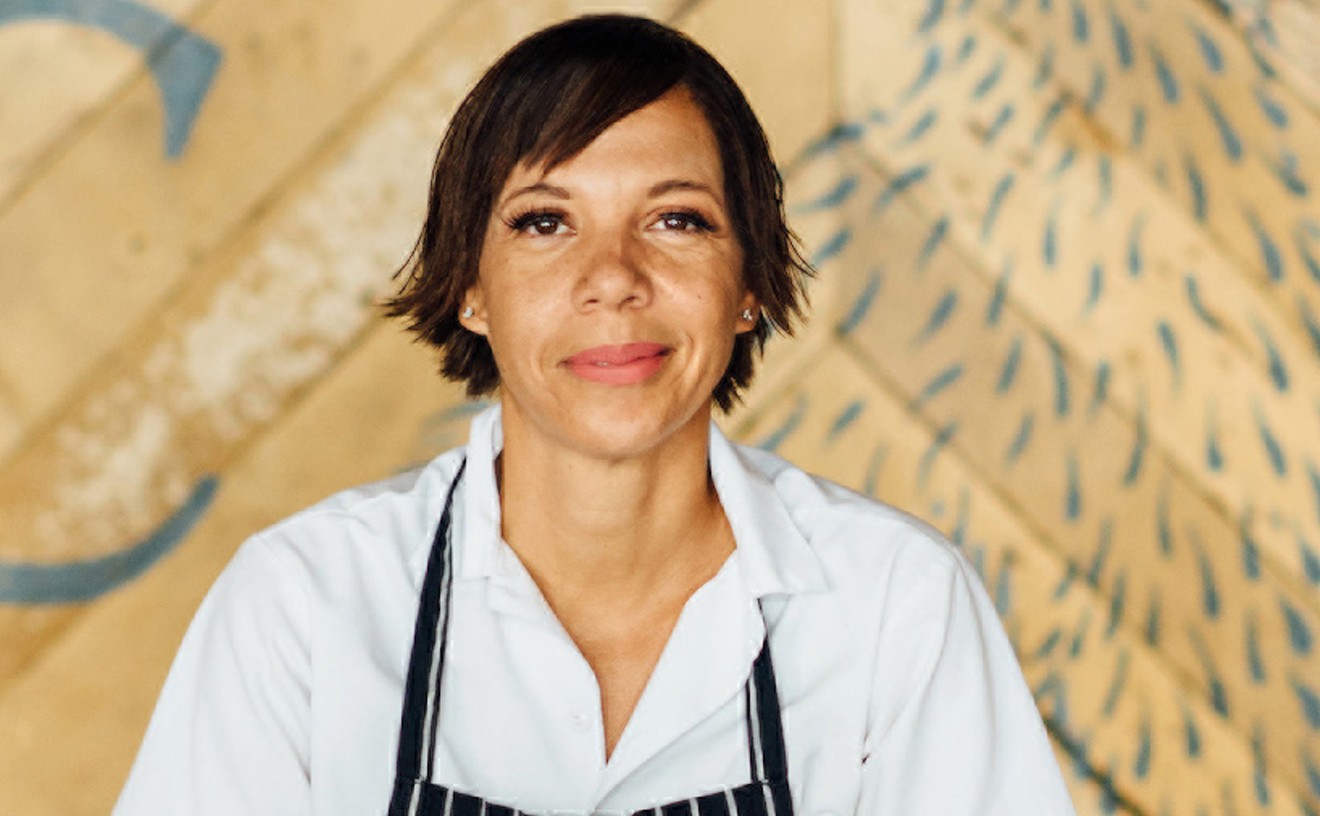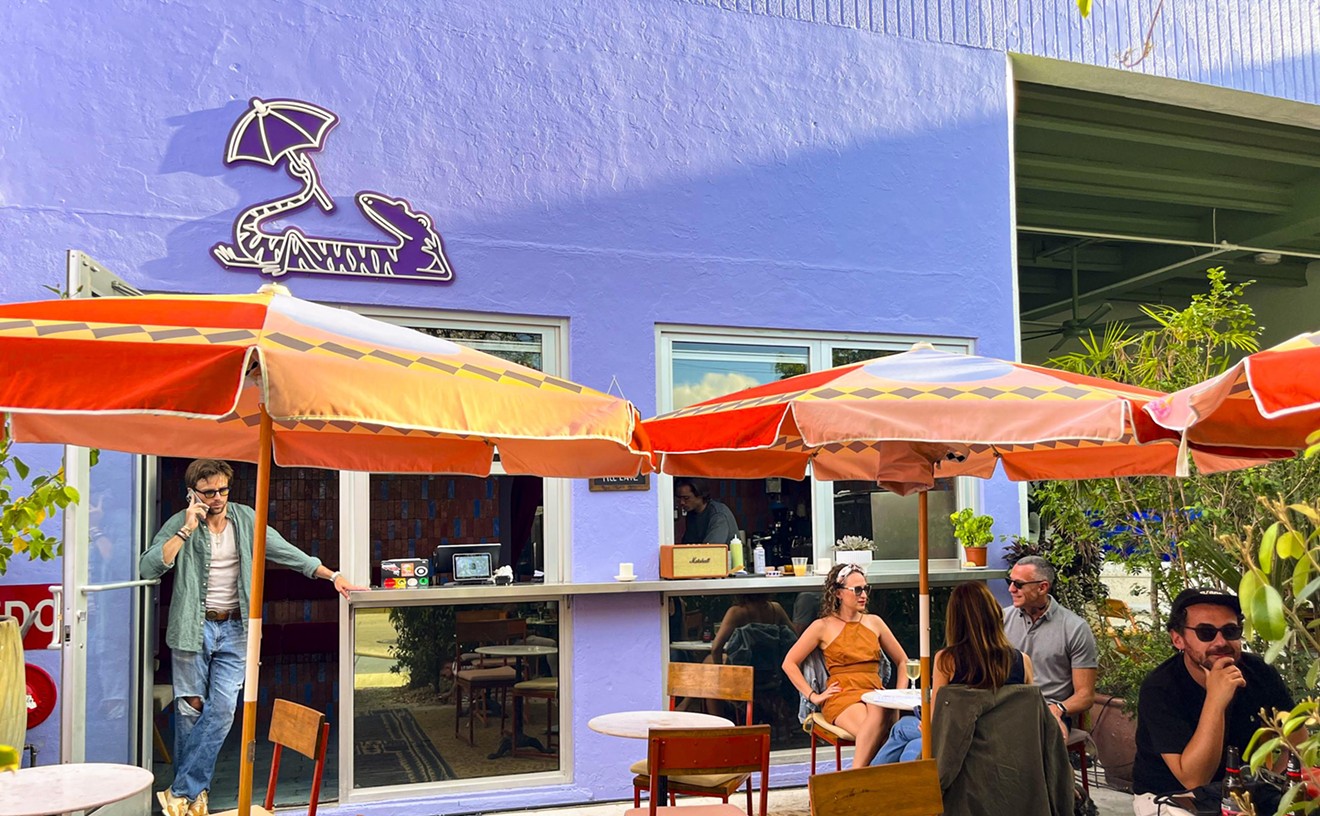Last week we told you about the pizza-making classes chef Jonathan Eismann hosts at Spartico (Have you signed up yet?), but now we'll delve a little deeper, both into the chef's personal story and his pizza-making background.
Let's face it -- we're all wondering what the heck happened to cause one of the most popular chefs to close four restaurants, all within a few months and a few blocks of each other. Some court cases, which we will explore in the next few days, might (or might not) shed some light.
But in the meantime, we're discovering Eismann is serious about his pies. As we sat together for this interview, a few feet from the oven, he asked the chef to prepare two pizzas, and he critiqued the finished product.
"When I come in daily here, I have each individual pizza cook make a Margherita," he said. "It tells me a number of things: what temperature my oven's running at, what the dough is doing, how the individual pizza-makers' hands are working that day, and consistency of ingredients."
At that point, he pulled out a bulging binder and flipped through it to show how he has every single recipe charted out with a photo for how the finished product should look. Asked if he was concerned that perhaps one of his employees would take that binder to a copier and try to sell Spartico's secrets, he replied, "[My chefs] have to know everything. With Pacific Time particularly, so many people, so many restaurateurs, and so many chefs sat at that kitchen bar -- we served over a million people there -- every chef and every restaurateur sat at that counter and was wondering what Jonathan's doing. I was very happy to tell them what to do. There was one thing they didn't have: my hands and my palate."
Yeah, Eismann doesn't seem to be lacking much confidence. Here's what he had to say about his mad pizza skills and more.
New Times: Anything else, aside from Spartico, going on with you restaurant-wise nowadays?
Jonathan Eismann: Yes.
In Miami?
Yes.
That's all you're going to say?
I'm looking at other things. Other ways.
So I have to ask: What the heck happened to all of your restaurants? You had Pacific Time, Pizza Volante, Q, Fin. It's been a rocky few years. What did you learn from all that?
Location, location, location. I don't like the word rocky.
But how can you say "location"? The Design District is huge! Schwartz is a hit there, Bernstein... Were you premature? You were a pioneer on Lincoln Road...
I was a pioneer in the Design District. I owned Grass Lounge. I was the landlord.
You must've seen potential.
My business acumen is good, but my geography was awful. Because of the development of the east side of the Design District and the heavy concentration of Christian Louboutin and the boutiques and a few restaurants, it's actually a pedestrian area. The west side of the Design District has no relationship to the east side of the Design District. It may very well in the future. I started restaurant culture in Miami. When I opened on Lincoln Road, there wasn't a single human being on Lincoln Road. Now there are buildings on Lincoln Road for sale for $150 million, so --
So you still say it's that area?
It was very premature. The location was not good. And there was also the opening of [the Shops at] Midtown Miami, which was a great surprise to a lot of people. We were seriously location-challenged.
You had a lot of investments there.
Listen, I'm a big boy. I'm an entrepreneur. Business is business.
What do you think of Miami's restaurant culture now? Is this still the place to be?
We need to go on to the next question.
That's a telling answer. OK, so what happened with Jeffrey Chodorow? I read you were supposed to be opening something with him.
That's potentially litigious.
So it's safe to say you're not doing anything in the future?
I'm not doing anything with him in the future.
And how did this whole Eismann at the Mayfair thing come about?
The owner is a gentleman by the name of Richard who is a great guy. He was impressed with Pacific Time and Pizza Volante and my restaurant Q. They wanted to move Pacific Time in here years ago and I said no.
With all due respect, I could see someone wanting a place like Pacific Time in a landmark hotel like this, but I never would've expected a pizzeria.
It was my idea to take a four-diamond hotel, such as this, and install a casual restaurant. It's 2011. And people like it.
Aside from your Pizza Volante, I never really saw you as a pizzaiolo.
I was anointed Best Pizza by Miami New Times last year for Pizza Volante. I've been making pizza for 26, 27 years. I hadn't for a long time, but the skill and understanding doesn't dissipate. I certainly don't pretend to be one of the best-informed, learned pizza-makers in the country, but I make great pizza. We have great basic stuff to work with.
The pizza at Spartico is totally different from the ones I remember having at Volante, though. Here they're crunchy and bubbly.
It's similar, but slightly different dough here. The primary dough I was using at Volante was the same dough I've been using as far back as 1984. Including the 17-year run at Pacific Time, consistency is my trademark.
The dough I used at Volante was really a New York City-style -- I grew up in Brooklyn -- dough. When I first developed it, I went to the pizzerias [where] I hung out as a kid and found out what ingredients they used. I took the exact brand ingredients, the exact type of flour, the exact type of yeast, the exact oil, the salt they were using, brand-by-brand, and brought them to my mentor. I was also working with some great people who made pizzas. New York does a lot of great pizza -- mostly Neapolitan-style pizza. Using ingredients I researched in New York and technique and skills from the chefs I was working with, we came up with an extraordinary pizza dough.
I hear the reason no one can really replicate New York-style pizza anywhere else might have something to do with the water. Any truth to that?
Maybe. Water in different parts of the world, including different parts of minerals, may have heavy minerals, heavy calcium... that has a lot of effect on baking.
Did you import water from New York for Volante then?
It wasn't imported. Maybe we did some things to it...
You won't say what?
Let's leave it at that.
Are there any secrets you can share?
One thing we do here is we cold-ferment dough. I'm not going to go into great detail about what that does, but you can see the pizza in front of you has bubbles. The bubbles indicate something's going on with this dough...
I didn't realize making pizzas was so involved.
A large part of my reputation of being a great cook and a great chef is that I have a grasp on a lot more than technique.
Are you going to go over all that technical stuff, like fermentation and water filtration, in the pizza classes? I'd imagine that detail would go over many heads.
People like to hear food talk. Listen, even if people in my pizza class are gonna buy their pizza dough at Publix, I'm gonna teach them how to make a great pizza.
What is the most important ingredient when making the perfect pizza?
Technique is an ingredient. Not to be obtuse, but without ingredients, you really can't make anything great.
Any secrets to making a decent pizza at home?
Have a pizza stone. That's it. Have a round pizza stone you can put in your oven. Don't do it on a sheet pan.
What's the biggest mistake home cooks can make?
Buying frozen pizzas.
Cute.
Tomorrow we'll find out what he wore to his first restaurant job (hint: it was made of crushed blue velvet -- egads!) and if his ego is satisfied... yet.
Follow Short Order on Facebook and Twitter @Short_Order.










